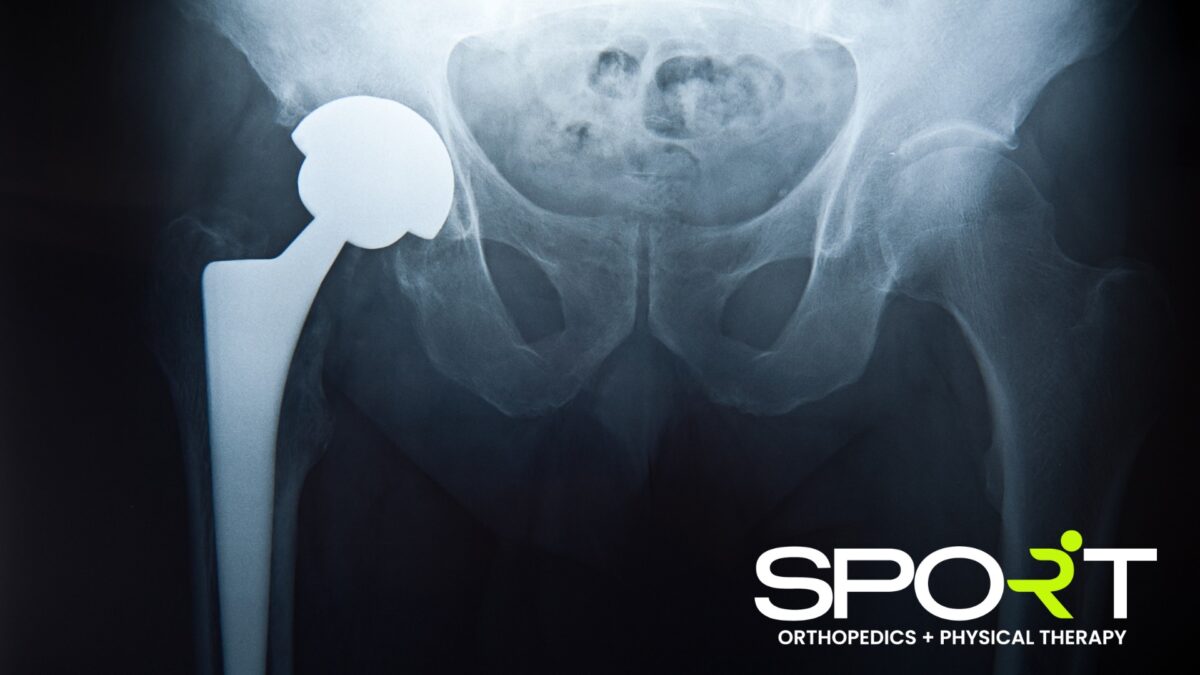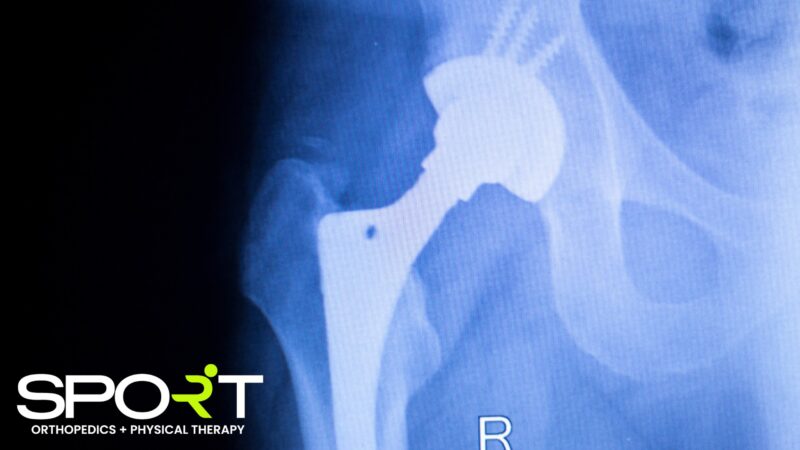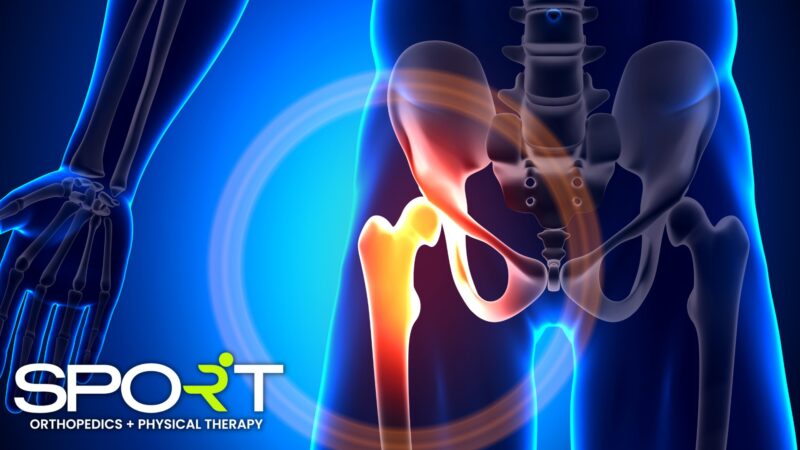Direct Anterior Hip Replacement Surgery in Dallas, Frisco, Plano, and Wylie
Anterior Approach Hip Replacement
What Is an Anterior Hip Replacement?
Living with hip pain can make performing simple, everyday tasks a painful ordeal. If you’re suffering from hip pain and have tried alternative, non-surgical treatments, it might be time to consider a total anterior hip replacement.
An anterior hip replacement is a minimally invasive surgery that allows the orthopedic surgeon to replace your hip joint while avoiding cutting through any muscles. Since the anterior approach does not disturb your muscles, this allows for a quicker recovery time. If you’re interested in anterior hip replacement surgery, contact the total hip replacement experts at SPORT Orthopedics + Physical Therapy to schedule an appointment today by calling 469-200-2832.
Anterior Hip Replacement vs Posterior
The most significant difference between anterior and posterior hip replacements is the location of the incision. During an anterior hip replacement, the surgeon will make an incision at the front of the hip. The incision site usually begins at the top of the pelvic bone and goes down to the top of the thigh. During a posterior hip replacement, the surgeon will make the incision on the side and back of the hip.

Which Method of Hip Replacement Is the Best?
While the orthopedic surgeon has a better view during posterior hip replacement surgery, the anterior approach is minimally invasive. It has fewer long-term restrictions following the procedure. The anterior hip replacements have a shorter recovery time due to the incision’s location since fewer muscles are damaged. Following this surgery, patients can go home quicker and return to everyday activities sooner. Using the anterior approach, fewer muscles are damaged, shortening recovery time.
Who Is a Good Candidate for Anterior Approach Hip Replacement?

You and your doctor will decide whether an anterior hip replacement would be the better option for your damaged hip joint. Most patients meet the guidelines for traditional hip replacement surgery, but the criteria for anterior are slightly more strict. When determining if you’re a good candidate for anterior hip replacement, your doctor will examine several factors, including weight and muscle mass. Also, patients that suffer from osteoarthritis are good candidates for the anterior approach. Ultimately, it will be up to you and your surgeon to decide what hip replacement approach you prefer.
Advantages of Anterior Hip Replacement
The direct anterior approach is a minimally invasive hip surgery option with several advantages over the other hip replacement options.
- Less muscle trauma: Using the anterior approach, surgeons can avoid cutting any major muscles. Since the incision is at the front of the hip, fewer muscles are located in that area. Using this approach, the surgeon can work between the muscles and avoid cutting through them or detaching them from the bones.
- Less pain: Patients usually experience less postoperative pain following this procedure because no major muscles are cut into. Less pain following surgery means that patients don’t require as much pain medication.
- Quicker recovery: Research has shown that anterior hip patients begin walking unaided five to seven days faster than traditional hip surgery patients.
- Fewer post-surgical precautions: Following hip replacement surgery, patients are given a list of movements and actions that should be avoided to prevent hip dislocation. These precautions are usually followed for the first six weeks post-op. After an anterior hip replacement, surgeons assign little to no post-surgical precautions.
How Do I Prepare for an Anterior Approach Hip Replacement?

Before your surgery, the medical team will help you prepare. It’s important to inform them about any health issues and drug allergies you might have. You’ll want to disclose any recent problems or illnesses that you recently had, like a fever. Notify your doctor if you believe you are pregnant.
Discussing your medications is also important so your doctor knows what you’re taking in case you need to stop taking certain medications before the surgery.
Your doctor may have you undergo several tests before your surgery, including X-Rays, an MRI, and an electrocardiogram.
You will likely need to refrain from eating or drinking the night before your surgery after midnight. It’s also recommended that you make adjustments around your home to prepare for when you are discharged. These changes can include a shower handrail and removing rugs and other trip hazards.
What Happens During Anterior Hip Replacement Surgery?

Prior to surgery, your medical team will tell you what you can expect during your anterior hip replacement surgery. An anesthesiologist will either administer general anesthesia or regional anesthesia so that you can relax and sleep during the surgery. After the anesthesia, the medical staff will monitor your vital signs before, during, and after the surgery. You might receive antibiotics to prevent any infection.
Before the surgeon begins, the surgical site will be cleaned, and hair will be removed. Once this has happened, the orthopedic surgeon will make the incision at the front of the hip joint and separate the muscles so that they can see the injured hip bone. The surgeon will then remove the upper part of the femur and damaged cartilage and bone from the pelvis. After the surgeon removes the bones and cartilage, the hip bone socket, head, neck, and part of the shaft of the femur will be replaced with the artificial joint. When the surgeon has the artificial joint in place, they will take an X-Ray to ensure it has been properly set. Either the surgeon or surgical assistant will close up the incision, and you will be transferred to recovery.
What Is Recovery from Anterior Hip Replacement Like?

Since anterior hip replacement is a minimally invasive surgery, the recovery time and rehabilitation are shorter than the posterior approach. Despite a quicker recovery time, there are steps that you need to take following your surgery to strengthen your new hip and improve your mobility.
Immediately following your surgery, you may be in the hospital for several days, depending on how you recover post-op. During this time, a physical therapist will visit you and begin working with you on getting up and moving around. It’s important to start moving as soon as you’re able to prevent blood clots from forming. Your surgeon will inform you of what not to do after hip replacement surgery.
Once you’ve been released, you’ll begin your physical therapy regimen. Your physical therapist will create an exercise routine specifically catering to your needs. You’ll work with them at your appointments, and they will most likely give you exercises to perform at home. At first, you may need to use walking aids to get around, but this is usually short-lived.
For a better idea of what your hip replacement recovery week by week might look like, please speak with our team. We would be happy to explain the recovery process in detail.
What Is the Success Rate of Anterior Hip Replacements?
Hip replacement surgery, regardless of the approach, is considered a highly successful surgery. While results vary from patient to patient, a 2019 study of over 15 years of follow-up showed that 77% of total hip replacements were still functioning at 25 years post-op.
Anterior Hip Precautions After Surgery
Since anterior hip surgery is minimally invasive, your doctor is less likely to give you post-operational surgical precautions. With the anterior approach, the muscles are not cut, which allows them to naturally support the hip joint, lowering the risk of hip dislocation. Listed below are some post-op surgical precautions that your doctor might suggest.
- Avoid bending your hip and turning your foot at the same time.
- Sleep with a pillow between your legs for six weeks.
- Avoid crossing your legs.
- Do not bend past a right angle.
- Avoid low chairs.
- Do not bend over to pick anything up.
- An elevated toilet seat is recommended.
Why Should You Choose SPORT for Your Direct Anterior Hip Replacement?

While an anterior hip replacement has many advantages and is a highly successful surgery, your results are only as good as your surgeon. This is why you want the best surgeons available when you’re considering total hip replacement. Our board-certified orthopedic surgeons at SPORT Orthopedics + Physical Therapy will perform your hip replacement surgery. With four locations in the Dallas area, you don’t have to travel far to get the best medical attention in the area.
Contact SPORT Orthopedics + Physical Therapy Today
Our top orthopedic surgeons at SPORT Orthopedics + Physical Therapy will have you back in action in no time. To learn more about a total hip replacement, call 469-200-2832 to schedule an appointment today.


